Super User
New bakery packaging concept reduces CO2 emissions by a third
Viipurilainen Kotileipomo is a nearly 100-year-old company that produces pastries and artisan breads from local ingredients using traditional methods. When the bakery was looking for a new solution for its cake packaging, its key criteria were to reduce the environmental footprint of the packaging, and to make assembly quick and easy.
Viipurilainen Kotileipomo and Metsä Board's packaging design team based at Metsä Board's Excellence Centre jointly developed a resource-efficient and 100% recyclable bakery packaging. The new eye-catching packaging reduces material requirements by 25%, and carbon dioxide emissions by 34% compared to the previous packaging. At the same time, the bakery was able to reduce its use of plastic by moving away from a PE-coated board. In addition to the environmental benefits, the design of the new bakery box makes it quicker and easier to assemble.
"Packaging sustainability is important to us and our customers, and it's great to be able to spread the word about reducing plastic and promoting recycling. The whole product development process was carried out in a structured way at the Excellence Centre and the new stylish packaging was quickly brought to market," says Teppo Ylä-Hemmilä, Bread Artist and Innovation Director, Viipurilainen Kotileipomo.
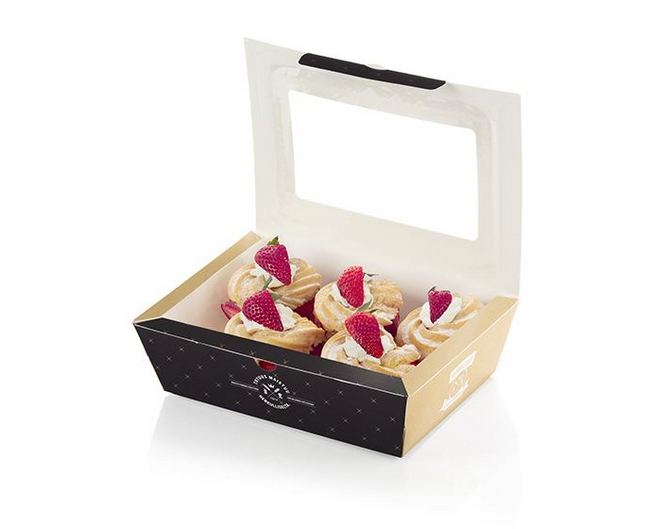
"The new concept is an excellent example of innovative solutions made possible by joint brainstorming. In designing the packaging, we used a virtual model at our Excellence Centre to quickly and accurately visualise the material, structure and its sustainability," says Ilkka Harju, Packaging Services Director, EMEA and APAC, Metsä Board.
The bakery packaging is made of lightweight MetsäBoard Prime FBB EB, a dispersion coated barrier board, which can be recycled using paper or paperboard collection waste streams. The MetsäBoard Prime FBB EB board is thick and resistant to grease, which is key for food that naturally have a high fat content such as pastries and cakes.
Metsä Board
www.metsaboard.com
Metsä Board is a leading European producer of premium fresh fibre paperboards. We focus on lightweight and high-quality folding boxboards, food service boards and white kraftliners. The pure fresh fibres we use in our products are a renewable and recyclable resource, that can be traced back to sustainably managed northern forests We are a forerunner in sustainability, and we aim to have completely fossil free mills and raw materials by the end of 2030.
Together with our customers we develop innovative packaging solutions to create better consumer experiences with less environmental impact. In 2021 our sales totalled EUR 2.1 billion, and we have around 2,400 employees. Metsä Board, part of Metsä Group, is listed on the Nasdaq Helsinki.
Metsä Group
www.metsagroup.com
Metsä Group leads the way in the bioeconomy. We invest in growth, developing bioproducts and a fossil free future. The raw material for our products is renewable wood from sustainably managed northern forests. We focus on the growth sectors of the forest industry: wood supply and forest services, wood products, pulp, fresh fibre paperboards, and tissue and greaseproof papers.
Metsä Group’s annual sales is approximately EUR 6 billion, and we have around 9,500 employees in 30 countries. Our international Group has its roots in the Finnish forest: our parent company is Metsäliitto Cooperative owned by nearly 100,000 forest owners.
Special paper testing machinery from emtec Electronic helps achieve higher quality paper and tissue products
At the Paperex India convention at the Indian Expo Center in Greater Noida, Delhi-NCR from May 10 – 13 2022, emtec Electronic will present specific testing and measuring devices that help manufacturers avoid common issues in paper manufacturing and converting.
Thousands of exhibitors and visitors will once again be able to gather for one of the largest paper industry trade fairs in the world, this time operating under stricter hygiene regulations due to the Covid-19 pandemic. Now in its 15th edition, the Paperex convention offers a series of exhibitions and conferences focusing on the paper, pulp and related industries. The international event typically attracts visitors and exhibitors from around the globe, boasting for example more than 600 exhibitors from 28 countries and nearly 30,000 visitors at the 2019 convention. This year, the program highlights include new segments such as printing, packaging, and publishing.
Leipzig-based device manufacturer emtec Electronic GmbH will also be represented at the convention this year to present their complete product range, with particular focus on those products that help paper professionals optimize their production processes, for example by determining the correct amount of additives on the wet end, predicting gluability and coating ability of paper and board, and determining the amounts of fines in the paper and board.

"Paper manufacturers are often on the lookout for new technology and methods to make the manufacturing process more efficient and sustainable without experiencing quality losses," says Alexander Gruener, Global Marketing and Business Development Manager at emtec. "Our equipment helps with this by quickly and reliably providing measurement data that lead to more efficient use of resources, less waste and greater control throughout the manufacturing process."
The 25-year-old company specializes in the manufacture of measuring and testing equipment for pulp, paper, board, and textiles and serves customers in more than 80 countries around the world. Visitors to the convention are invited to stop by booth J40 during the convention. Emtec representative Deepak Pachkude from partnering company Rishab Metals will be available to answer questions, provide demonstrations, and explain the measuring principles behind the emtec devices.
About emtec Electronic
Emtec Electronic GmbH develops, produces and distributes worldwide testing and measuring devices for the detection of relevant processing properties of paper, board, nonwoven and textile materials. The portable measuring devices enable manufacturers and converters of paper, nonwoven and textile products for example, to control and optimize the manufacturing and converting processes during ongoing production. From the wet end to the final product, the application of the devices enables an efficient process to achieve and ensure the best possible quality with the least possible effort.
For 25 years, we have relied on innovative, highly specialized measuring instruments combined with a high degree of service orientation. Since the company was founded, we have been intensively involved in scientific cooperation with institutes and companies, further developing instruments for our customers and offering a broad network in over 80 countries from our Leipzig location.
For more information about emtec Electronic, please visit the website:
Toscotec to install TT SteelDryers in North America.
Toscotec will supply several TT SteelDryer cylinders for two paper machines at the facilities of two confidential manufacturers in North America. The projects are slated for completion in 2022.
By replacing the mills’ existing cast iron cans, the new TT SteelDryers will boost the drying capacity of the paper machines and lead to a significant production increase. The steel dryers are custom sized, which allows for an easy replacement of the old cylinders maintaining the same overall dimensions of the dryer section and avoiding the costly substitution of the machine frame, housings, bearings and steam equipment. Finally, Toscotec’s steel dryer cylinders will keep the same total face length of the existing dryers while allowing the enlargement of the paper width of the machine.
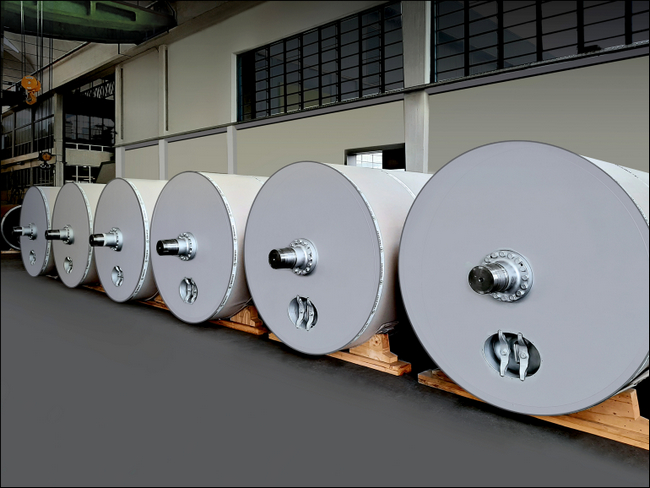 Toscotec’s TT SteelDryers.
Toscotec’s TT SteelDryers.
Fabrizio Charrier, Sales Manager of Toscotec’s Paper & Board division, says: “Toscotec continues to grow in the North American market that is clearly moving towards more energy efficient solutions, and the upgrade of existing equipment with state-of-the-art technology such as TT SteelDryers.”
Toscotec strengthens its position as leading supplier of steel dryer cylinders, which deliver significantly higher performances than cast iron cans. Building on its substantial expertise in customizing the design of TT SteelDryers to the specific needs of the mill, Toscotec delivers tailor-made technology designed to achieve the highest possible production capacity and energy efficiency.
For more information, please contact:
Fabrizio Charrier, Sales Manager, Paper & Board division, This email address is being protected from spambots. You need JavaScript enabled to view it.
Valmet to supply a fiberline modernization to CENIBRA's pulp mill in Brazil
Valmet has been selected as supplier for the modernization of the fiberline no. 1 plant to CENIBRA's pulp mill in Belo Oriente in Brazil. The fiberline will be prepared for a capacity increase of 100,000 tonnes of pulp per year. The start-up is scheduled for September 2023.
The order is included in Valmet's orders received of the first quarter 2022. The total value of an order of this type and delivery scope is typically around EUR 25-40 million.
The fiberline plant will utilize the most advanced technology available. The modernization is part of CENIBRA's project to increase the pulp mill capacity. After the successful supplies of the bleaching line 3 in 2016 and the bleaching line 2 in 2018, Valmet and CENIBRA agreed on supplying and installing the latest technology of Valmet TwinRoll Presses for the modernization project of the line 1. The target of the modernization project is to cut down the chemical consumption of the bleaching process and to reduce the environmental impact.
"Along the years, CENIBRA has searched the balance between the production activities and the environmental performance, always looking for process improvements in pulp production through implementation of environmentally sustainable projects and technological innovations. The new fiberline is one step forward in this journey, increasing the pulp capacity," says Industrial Director, Júlio Ribeiro from CENIBRA.
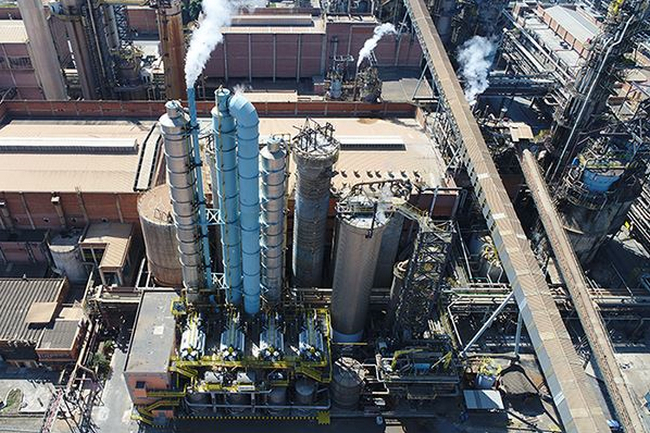
“We are very proud to once again be selected by CENIBRA. The new project shows their confidence in Valmet’s technology and delivery capacity. The latest bleaching project was a challenge for both companies, and we reached excellent results. The collaboration with CENIBRA is expected to continue with commitment and good communications. By upgrading individual key process parts to the latest technology, it is possible to significantly reduce the environmental impact, and at the same time increase the performance of the production process,” says Igor Panassol, Sales Manager for fiber line, South America Area, Valmet.
Technical information about the delivery
The delivery comprises an oxygen delignification stage and four new washing equipment to brown stock washing and post delignification washing. The washing utilizes the Valmet TwinRoll press technology for easy maintenance and delivers low energy consumption as well as high availability.
About the customer
Celulose Nipo-Brasileira S.A. - CENIBRA is one of the world’s biggest producers of bleached eucalyptus pulp (hardwood). Their annual production is approximately 1,200,000 tons, of which more than 90% is exported. CENIBRA operates in 54 municipalities of the Minas Gerais state. As a recognition of the work with highest international standards of excellency CENIBRA is certificated in standards ISO 9001 / ISO 14001 / ISO IEC 17.025 and has the Forest Stewardiship Council - FSC certificates and the National Program of Forestall Certificate (CERFLOR). The pulp traceability can be done from the forest to customer or from the customer to forest.
Valmet is a leading global developer and supplier of process technologies, automation and services for the pulp, paper and energy industries. With our automation systems and flow control solutions we serve an even wider base of process industries.
We aim to become the global champion in serving our customers. Our 17,000 professionals work close to our customers and are committed to improving our customers’ performance – every day.
The company has over 220 years of industrial history and a strong track record in continuous improvement and renewal. In 2022, a major milestone was achieved, when flow control company Neles was merged into Valmet. The combined company net sales in 2021 was approximately EUR 4.5 billion based on the respective company figures.
Valmet’s shares are listed on the Nasdaq Helsinki and the head office is in Espoo, Finland.
Follow us on valmet.com
Ashdown Mill A62 Paper Machine Resumes Full Operation
The A62 paper machine at our Ashdown Mill is once again fully operational thanks to excellent planning and foresight by our commercial paper team, along with outstanding dedication and agility from our manufacturing production team.
The strategic initiative to restart the previously idled machine, as well as a sheeter to convert the rolls into cartons of copy paper, is helping us maintain our leadership position in the North American uncoated freesheet paper market and deliver the service and quality our customers expect.
The A62 paper machine was idled in April 2020 — a difficult but necessary action taken to align our manufacturing network’s paper production capacity with reduced customer demand that was brought on the COVID-19 pandemic.
“With offices, businesses and schools closed in a large part of our markets, we had to take the appropriate steps to optimize our operations and match our capacity to our reduced demand,” says Rob Melton, senior vice president, pulp and paper commercial.
Then, as the economy recovered from the pandemic, so did the demand for paper. Demand for uncoated freesheet paper increased four percent in 2021 compared to 2020, driven by increased retail activity, in-person store visits, reopened schools and employees returning to the office.
With the economy rebounding from the impacts of COVID-19, the decision was made to restart A62, adding back the paper production capacity necessary for us to meet increasing customer demand.
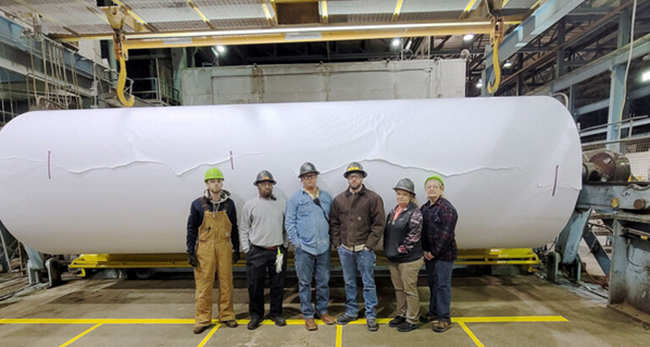
“Our customers’ business is steadily growing, and we’re fortunate to be able to support that growth by leveraging our asset base’s flexibility,” adds Melton.
But restarting a large uncoated freesheet paper machine isn’t as simple as plugging in your desktop printer or turning on a lamp. It’s a complex undertaking with, quite literally, a lot of moving parts. Restarting a machine such as A62 occurs over a period of months to gradually build the machine up to its current 24/7 run schedule.
“With customer demand for paper on the rise, we knew we had to act quickly to restart the machine to ensure we could continue to meet our customers’ needs,” says Bill Edwards, senior vice president, pulp and paper operations.
The mill team faced an aggressive timeline to restart and steadily increase production on a machine that hadn’t run in more than a year. Moreover, many members of the team were unfamiliar with the machine. They were recalled to the mill specifically for this project after having previously worked in other areas of the mill prior to the pandemic. The team pulled together and was able to restart the machine and sheeter on time and budget.
“I’m very proud of the way the entire team at the Ashdown Mill responded to this task with agility and enthusiasm,” says Mill Manager J.C. Allaire.
With demand for uncoated freesheet paper still on the rise, Edwards says his team continues to look for ways to implement continuous improvement projects to maximize production capacity at each of our mills.
“One of Domtar’s many competitive advantages is the strength and depth of our manufacturing asset base,” says Edwards. “We are able to act quickly and decisively to ensure we can support our customers.”
The latest Innovations and Technology of Tissue paper converting industries at AMACO GROUP Open House Lebanon
On the occasion of its expansion, and to keep pace with the developments of modern technology in the field of Tissue Paper Converting machines, Amaco Group organized an Open House in its headquarters in Sidon, South Lebanon, announcing its latest innovations and providing the best machines with the latest technologies in terms of production capacity and specifications, Amaco is keen on providing customer’s needs as much as possible.
The industrial sector in general, and the manufacture of paper-making machines in particular, are witnessing rapid developments, especially at the technological level, And especially after the corona pandemic , which made the demand on tissue paper requirements increase . For this reason, Amaco Group continuously updates its systems and adopts the best technologies
Amaco’s guests and customers toured the different sections of the factory, where the host engineers and technicians gave a full demonstration on the latest techniques & innovative technology.
The engineering department conducted demonstrations about the machines run and function, and the production capacities that characterize each machines.
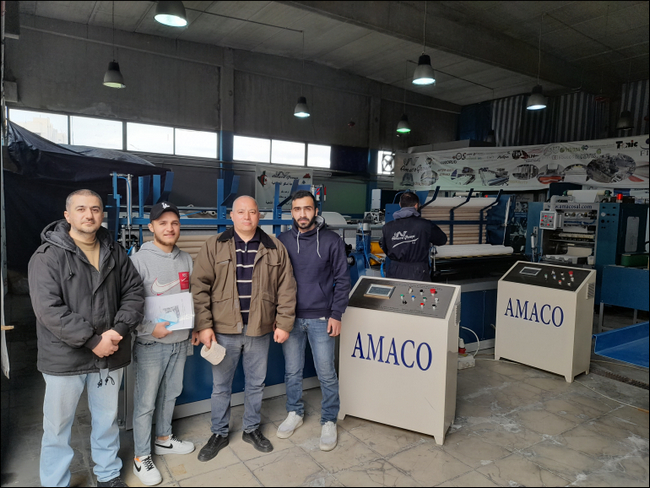
One of the company’s engineers introduced Amaco’s latest innovative system: the after-sales service that was launched to meet the needs of Amaco’s partners and customers around the world, named” AMACO’s Online Customer Service System”. (Online spare parts & technical support system).
Accordingly, AMACO GROUP always works on updating its systems and adopting the best techniques. It also keeps on training its team work of engineers, technicians, and administrators to enable them to carry out their tasks in the best possible way on one hand, and to identify the latest technologies regarding the manufacturing of tissue paper machines on the other hand.
Group of machines was delivered through contracts that were signed to many factories in Lebanon, MEA area and in the Arab world.
All these factors were translated by obtaining a patent as a result of the development executed on the Hygienic Tissue Paper Converting machines, as well as by obtaining the European CE - Certificate of Conformity.
BillerudKorsnäs completes acquisition of Verso
BillerudKorsnäs announces the completion of its acquisition of Verso for a purchase price of approximately USD 825 million in cash. Verso is a leading producer of coated paper in North America, with 2021 net sales of USD 1 278 million and adjusted EBITDA of USD 223 million.
The acquisition of Verso reinforces BillerudKorsnäs’ strategy to drive profitable and sustainable growth and its ambition to accelerate its growth in North America. As a result of the acquisition of Verso, BillerudKorsnäs is now one of the largest providers of virgin paper and packaging materials with a cost and quality advantage. Combined 2021 net sales for BillerudKorsnäs and Verso amounted to approximately SEK 37.2 billion.1
 BillerudKorsnäs is committed to continuing to serve Verso’s customers across all segments and realising its previously announced plans to convert several of Verso’s assets into paperboard machines, while maintaining Verso’s position as a quality and cost leader in speciality and coated paper. Effective 1 April 2022, Rob Kreizenbeck, Verso’s SVP of Operations, assumes the position of President, North America in BillerudKorsnäs’ Executive Management Team. Going forward, BillerudKorsnäs intends to simplify its company name and brand to “Billerud”, which it will operate under in all markets, including the U.S. The Board of Directors will propose at the 2022 Annual General Meeting to amend the company’s name to Billerud AB (publ), and the change will be successively implemented thereafter.
BillerudKorsnäs is committed to continuing to serve Verso’s customers across all segments and realising its previously announced plans to convert several of Verso’s assets into paperboard machines, while maintaining Verso’s position as a quality and cost leader in speciality and coated paper. Effective 1 April 2022, Rob Kreizenbeck, Verso’s SVP of Operations, assumes the position of President, North America in BillerudKorsnäs’ Executive Management Team. Going forward, BillerudKorsnäs intends to simplify its company name and brand to “Billerud”, which it will operate under in all markets, including the U.S. The Board of Directors will propose at the 2022 Annual General Meeting to amend the company’s name to Billerud AB (publ), and the change will be successively implemented thereafter.
“I am very glad to welcome the entire Verso team to BillerudKorsnäs. Our combined assets and expertise in high-quality virgin fibre paper and board packaging materials create an excellent platform for sustainable and profitable growth. Integration work starts immediately, and we look forward to working together, sharing knowledge, initiating preparations for the conversion project and realizing a successful development,” comments Christoph Michalski, President and CEO of BillerudKorsnäs.
“We are excited to join forces with BillerudKorsnäs and become a larger, stronger organization. Together, we are building a company that is passionately committed to a strong safety culture, sustainability, superior quality and delivering value to our customers,” says Rob Kreizenbeck.
The negative cash flow effect of the acquisition for BillerudKorsnäs amounts to approximately SEK 6.0 billion. The transaction was financed by bank loans, which BillerudKorsnäs plans to refinance through the issuance of debt instruments and an equity rights issue during 2022. Verso will be consolidated in BillerudKorsnäs’ accounts from today and will be reported in the product area Paper. BillerudKorsnäs expects the acquisition to be accretive to earnings per share immediately and to create significant shareholder value over time with a more profitable product mix.
The date of publication of BillerudKorsnäs’ interim report for the first quarter 2022 has been changed to 5 May 2022.
As a result of the transaction, Verso common stock ceased trading on the New York Stock Exchange prior to the opening of trading today.
1) Reported net sales for 2021. Calculation based on USD/SEK 8.58 (average 2021).
Solenis Is Creating New Packaging Centers of Excellence To Serve Global Consumer Paper Packaging Market
New facility in Germany, along with new virtual collaboration portal, reinforces company’s commitment to helping customers develop sustainable packaging
Solenis, a leading global producer of specialty chemicals, is developing two new international centers of excellence for advancing sustainable solutions in the consumer paper packaging industry.
Currently under construction in Mönchengladbach, Germany, one center of excellence is expected to be finished in late 2022. The other center, a new Solenis virtual collaboration portal, will also launch before the end of the year. The virtual portal will allow customers to participate in live, real-time lab trials and watch videos on experiments and testing capabilities in the areas of strength, digital print, barrier coatings and colorants.
The center in Mönchengladbach will be integrated with customer application labs in a new facility totaling nearly 2,200 square meters. It will feature a variety of capabilities and several new pieces of equipment, including hot air sealing devices and a pilot scale coater used for development, screening and customer support, mainly in the area of barrier coatings.
These new centers of excellence join the existing facility already available in Wilmington, Delaware. Solenis is reviewing plans to upgrade and expand this facility in the near future. The company is also assessing options to open a packaging center of excellence in Shanghai, China, to support customers and meet the growth of sustainable packaging in the Asia Pacific region.
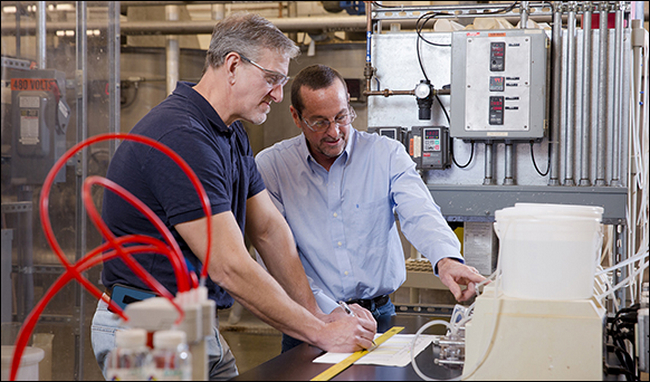 With a sole focus on addressing the latest paper packaging challenges, the new centers of excellence add to the company’s global network of R&D capabilities.
With a sole focus on addressing the latest paper packaging challenges, the new centers of excellence add to the company’s global network of R&D capabilities.
The growing demand for environmentally sustainable packaging led by consumers, brands and regulators is creating unique opportunities for the paper packaging industry to deliver alternatives to single-use plastics. Solenis is at the forefront in developing PFAS-free barrier coatings to help replace plastics used in fast-food packaging, corrugated board, single-use cups and other food and beverage packaging elements. The company also provides other key products, such as strength additives for paper and board packaging.
With a sole focus on addressing the latest paper packaging challenges, the new centers of excellence add to the company’s global network of R&D capabilities. Paper manufacturers, converters and consumer brand owners will be able to use the centers to collaborate with Solenis scientists on R&D efforts to solve their packaging issues. Customers and partners will have access to expert support and the latest solutions from the company’s broad portfolio of both functional chemistries and sustainable barrier coatings.
“The goal of both Solenis centers is to foster collaborative partnerships and alliances across the entire supply chain to accelerate innovation and bring novel sustainable products to market faster,” said Christoph Adami, Vice President, Global Marketing and Technology, Consumer Solutions. “Not only are we expanding our technical capabilities but also our offerings to collaborate physically and virtually with customers and partners. The new centers represent Solenis’ ongoing investment in developing paper packaging solutions.”
“As a full-service provider of a complete range of chemistry solutions essential to paper packaging performance, Solenis is uniquely positioned to work across the entire value chain and offer new-to-the-world solutions that meet the sustainability challenges facing the industry today,” said Richard Brooks, Global Marketing Director, Food Packaging. “We’re proud to drive the industry to a more sustainable future, and we hope to foster critical partnerships around a common goal.”
About Solenis
Solenis is a leading global producer of specialty chemicals, focused on delivering sustainable solutions for water-intensive industries, including the pulp, packaging paper and board, tissue and towel, oil and gas, petroleum refining, chemical processing, mining, biorefining, power, municipal, and pool and spa markets. The company’s product portfolio includes a broad array of water treatment chemistries, process aids and functional additives, as well as state-of-the-art monitoring and control systems. These technologies are used by customers to improve operational efficiencies, enhance product quality, protect plant assets, minimize environmental impact and maintain healthy water. Headquartered in Wilmington, Delaware, the company has 47 manufacturing facilities strategically located around the globe and employs a team of over 6,000 professionals in 120 countries across five continents. Solenis is a 2021 US Best Managed Company.
For additional information about Solenis, please visit www.solenis.com
Commission Proposal for a Regulation on ecodesign includes important principles of sustainability
The European Commission presented its proposal for a Regulation on ecodesing for sustainable products. The Regulation provides an overarching framework to ensure sustainability considerations are properly accounted for, before a product is placed on the internal market.
The Commission has worked on setting guidelines for sustainable product design, aiming to make products fit for a climate-neutral, resource efficient and circular economy, while reducing waste generation. The proposal also aims to ensure that the performance of frontrunners in sustainability progressively becomes the norm. The pulp and paper industry is already leading in many areas of sustainability, and has pledged to further support the development of sustainable products. However, Cepi, the Confederation of European pulp and paper producers, considers that two important requirements for products sustainability could figure more prominently in the proposed Regulation.
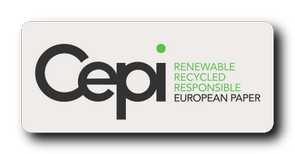 The ecodesign requirements laid out in the proposal are set up to be applicable to the broadest possible range of products: durability, reusability, upgradability and reparability, the presence of substances of concern in products, product energy and resource efficiency, recycled content in products, product remanufacturing and high-quality recycling, and the reduction of the carbon and environmental footprints. Considering this list, Cepi thinks that the additional requirement of renewability will need to be included and that recyclability should be addressed in a more consistent manner. These two requirements could eventually apply to many products, not limited to the pulp and paper industry, providing that fossil-based materials are progressively replaced with renewable and circular ones:
The ecodesign requirements laid out in the proposal are set up to be applicable to the broadest possible range of products: durability, reusability, upgradability and reparability, the presence of substances of concern in products, product energy and resource efficiency, recycled content in products, product remanufacturing and high-quality recycling, and the reduction of the carbon and environmental footprints. Considering this list, Cepi thinks that the additional requirement of renewability will need to be included and that recyclability should be addressed in a more consistent manner. These two requirements could eventually apply to many products, not limited to the pulp and paper industry, providing that fossil-based materials are progressively replaced with renewable and circular ones:
- Renewability: As the product portfolio of our industry continues to expand, we keep proving that forests can provide alternative solutions to products which are currently made with materials that do not naturally replenish themselves. For this reason, it is important, whenever possible, to incentivise ‘renewable products’ made of resources that can be sustainably managed rather than on finite resources.
- Recyclability: Cepi welcomes that recyclability is addressed as part of the product parameters mentioned in annex I (d) as ‘ease and quality of recycling’. A requirement to design and manufacture products so that they can be recycled, is imperative to product circularity and a key enabler of high-quality recycling. High-quality recycling in the case of paper products means they are recycled back in the paper industry to become new paper products. However, ‘ease of recycling’ needs to be consistently addressed throughout the proposal, for example also in the context of the amounts of waste generated and the ease of re-use annex I (p). Design for recyclability requirements could also address the presence of substances of concerns, which negatively affect the re-use and recycling of a given product. Circularity by Design Guidelines for Fibre-Based Packaging have already been developed within the framework of 4evergreen, a cooperation between brands and the packaging value chain.
The broad requirements laid down in the new Regulation will be complemented by product group specific delegated acts. To ensure policy cohesion and avoiding regulatory overlaps, Cepi acknowledges the Commission’s intention to carefully assess already existing legislation and definitions when drafting the upcoming product-specific delegated acts. For our industry, this would mean consistency with the circularity aspect of fibre-based packaging under the Packaging and Packaging Waste Directive, and coherence with forest-related sustainability requirements, such as in the Renewable Energy Directive. This Directive already includes requirements on energy from sustainable forest management that could similarly apply on products.
Quote:
“In the move towards sustainability, we need to examine sourcing of the raw materials that we use. It is often raw materials that are the biggest cause for concern for the environment, and it is here where change needs to take place. Anything you can do from fossil raw material you can also do from wood in a way that is better for the planet. Europe can be more strategic in using its own renewable resources, waste and leading technology to advance a made-in-Europe industry of the future.”
Jori Ringman, Director General – Cepi (Confederation of the European Paper Industries)
About Cepi :
Cepi is the European association representing the paper industry. We offer a wide range of renewable and recyclable wood-based fibre solutions to EU citizens: from packaging to textile, hygiene and tissue products, printing and graphic papers as well as speciality papers, but also bio-chemicals for food and pharmaceuticals, bio-composites and bioenergy. We are a responsible industry: 86% of our raw materials are sourced from within the European Union and 78% of the wood comes from certified forests, 92% of the water we use is returned in good condition to the environment. We are the world champion in recycling at the rate of 73.9%. At the forefront of the decarbonisation and industrial transformation of our economy, we embrace digitalisation and bring 18.5 billion value addition to the European economy and €4.5 billion investments annually. Through its 18 national associations, Cepi gathers 495 companies operating 895 mills across Europe and directly employing more than 180,000 people.
More information about our sustainability performance here.
It’s True: Paper Products Are Not a Major Contributor to Climate Change. Here’s Why…
If you’ve been following Two Sides or other authoritative sources, you know that the paper products you use do not contribute in any major way to climate change. Why? Because most of the energy used to manufacture them is generated using renewable, carbon neutral biomass. But what does this really mean?
The life cycle of paper, like that of any other widely manufactured and used product, does involve the emission of carbon – the key element in most greenhouse gases. However, with paper, there’s a critical difference.
To put it simply, the carbon released from burning biomass does not contribute to climate change, while the carbon released from fossil fuel does.
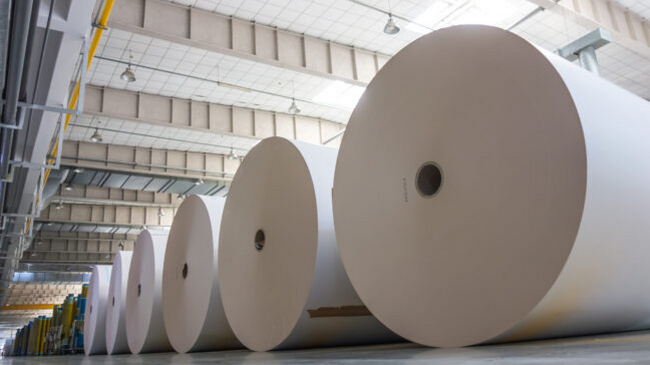
Biomass, also called biogenic carbon, is carbon that is absorbed from the atmosphere and stored in trees and other vegetation though photosynthesis. When that biomass later decays in the forest or is burned – either in forest fires or as fuel in a paper mill – its carbon returns back to the atmosphere in an endless natural loop that continuously recycles the same carbon atoms (called the “terrestrial carbon cycle”). Consequently, no new carbon is added to the environment.
On the other hand, the carbon from fossil fuels originates from deposits that have been stored in the earth for tens of millions of years. When coal and oil are extracted from those deposits and burned for energy, “new” carbon from outside the terrestrial carbon cycle is added to the atmosphere. The result is a net increase in greenhouse gases. And that is what’s warming the climate.
In an interesting take on the difference between the two sources of carbon, the U.S. Department of Agriculture compares them to the relationship between landlords and tenants. Biogenic carbon emissions are like tenants who “stay only the duration of their short-term leases, and politely leave over time as the regenerating forest calls them back,” while fossil fuels are “carbon tenants who squat permanently in our home and change the balance we previously had.”
Think about it. Humans have been burning biomass – especially wood – as a primary source of heat for millennia. Yet, as paleoclimatologists have found, not until the industrial revolution, with its massive reliance on fossil fuels, have greenhouse gases begun to increase so dramatically in the atmosphere. Before the widespread use of fossil fuels, the maximum concentration of carbon dioxide equivalent (CO2-e) held steady at a maximum of around 280 parts per million (ppm). Since then, however, that concentration has climbed to over 500 ppm, and it continues to increase.
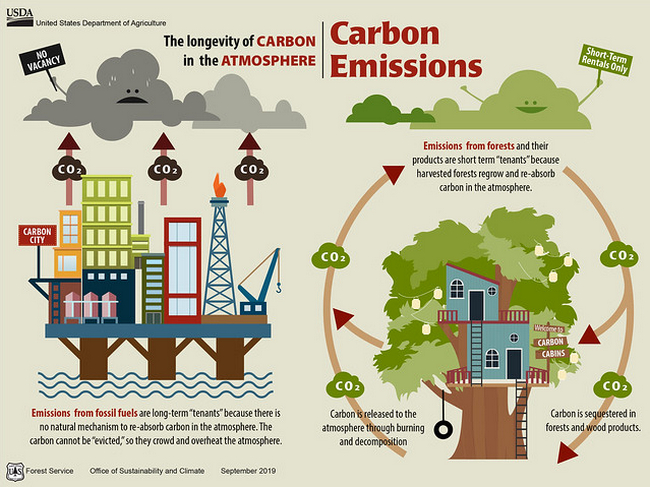
The work of the national and international agencies and bodies directly responsible for the study, regulation and accounting of greenhouse gases is based on the fundamental finding that fossil fuel carbon, not biogenic carbon, is the problem. Among these organizations are the Intergovernmental Panel on Climate Change (IPCC), the International Energy Agency, the U.S. EPA and the U.S. Department of Energy, to name a few.
It follows then, that a biomass-based industry like papermaking, which uses and emits mostly biogenic carbon, is not a major contributor to climate change. In fact, that’s what the numbers show. The U.S. Environmental Protection Agency (EPA) and Natural Resources Canada report that the pulp and paper industry in their respective countries is responsible for only 0.5% and 1.2% of total annual CO2-e emissions. The IPCC states that over the course of a year, the CO2 emissions from the combustion/oxidation/decay of biomass are balanced by carbon uptake prior to harvest, so the net emission is zero. IPCC also states that when used to displace fossil fuels, wood-based fuels can provide sustained carbon benefits and constitute a large [carbon] mitigation option.
It is true that over the life cycle of paper, some carbon is released as greenhouse gases other than CO2. For example, paper that decomposes in landfills releases methane. However, the more paper products are recycled, the less methane is emitted, and paper is recycled more than any other material in the United States. By reducing the amount of paper products going to landfills through recycling, U.S. greenhouse gases emissions were lowered by 155 million metric tons of CO2-e in 2018 – the equivalent of taking over 33 million cars off the road for an entire year, this according to the U.S. EPA.
For more information, download the updated Two Sides Fact Sheet on Paper, Renewable Energy and Carbon Footprint here.
by Kathi Rowzie, President, Two Sides North America
